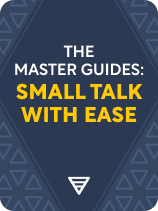

This article is an excerpt from the Shortform book guide to "The Master Guides: Small Talk With Ease" by Shortform. Shortform has the world's best summaries and analyses of books you should be reading.
Like this article? Sign up for a free trial here.
Would you like to feel more confident and skilled in social situations? What do you still have to learn about the art of conversation?
Being skilled in initiating a conversation is important, but it’s also valuable to know how to keep a conversation flowing and then end it well. We’ve put together some tips from several communication experts that directly address these two skills.
Keep reading to learn several techniques that will help make you an excellent conversationalist.
How to Keep a Conversation Flowing
First, we’ll explore how to keep a conversation flowing in a way that allows your conversation partner to shine. Then, we’ll consider some advice on how to end a conversation in a memorable and positive way.
Technique #1: Focus on Their Positive Traits
In 4 Essential Keys to Effective Communication, poet and relationship skills trainer Bento C. Leal III suggests that the key to good conversations is figuring out what makes others unique and worthy. To do this, consider the positives of each person you encounter and your relationship with them—what are their skills, talents, positive traits, and so on? What can you learn from them?
In How to Talk to Anyone, Leil Lowndes adds to this by explaining that, the more you focus on others’ good qualities, the more they’ll appreciate you for seeing the best in them. She suggests that you focus your attention only on the good things about them. Don’t put them down or make jokes at their expense. Likewise, don’t draw attention to their faults—for example, if they fumble in some way or say something inappropriate. Instead, do your best to make them feel comfortable and accepted for who they are.
One way to put this into practice is to give genuine compliments. Think about what you’re learning about them and what they seem to care about, and use complimentary statements to uplift them. This will make them feel appreciated and will encourage them to continue talking. For example, if they’ve been discussing parenthood, say something like, “Well, it sounds like your children are lucky to have you.”
Technique #2: Ask Open-Ended Questions
According to Debra Fine in The Fine Art of Small Talk, a conversation flows best when you create opportunities for your partner to share details you can explore more deeply. Therefore, ask your conversational partner open-ended questions that demand more than a one-word answer. Show interest and encourage them to talk about themselves: The more your partner gives you, Fine says, the more you’ll have to work with later.
Journalist Kate Murphy (You’re Not Listening) expands on this by explaining that open-ended questions allow the speaker to direct the conversation—in contrast to closed questions that steer the conversation in a particular direction. By asking open-ended questions, you can encourage the other person to speak freely about whatever they want.
For example, if someone tells you about getting lost while traveling abroad, you could ask an open-ended question like, “How did you react?” instead of a closed question like, “Did you have a map?” The first question allows the speaker to choose the direction of the conversation, while the second one narrows the conversation to a detail chosen by the listener.
Technique #3: Highlight Shared Connections
According to Vanessa Van Edwards (Captivate), finding your similarities with others makes you more appealing to them because we like and get along more easily with people who agree and share common interests with us. You can take the following steps to identify and illuminate your similarities with others:
- Find out if you share friends or interests, or are engaged in any of the same online or in-person groups, like a book club or gym class.
- Ask why the friend, interest, or group you have in common matters to the other person. She suggests asking “why?” repeatedly as a way to probe deeper and enrich your understanding of the conversation.
- Offer to help or be a resource for the other person if 1) you feel you’ve developed a genuine connection with them and 2) you have something useful you can provide them.
Technique #4: Listen Attentively
In The Charisma Myth, charisma coach and keynote speaker Olivia Fox Cabane explains that being a good listener is important because humans tend to associate the people, places, and things around them with their emotional state, even if the connection isn’t logical. This means that how your partner feels when talking to you is far more important than what you talk about. If you make them feel good by being genuinely interested in them, they’ll perceive you as a fascinating conversationalist—even if you do nothing but listen.
World-renowned emotional intelligence expert Travis Bradberry (Emotional Intelligence 2.0) adds that listening isn’t just about hearing words but also understanding the accompanying signals. He says tone, volume, and pacing all signal subtext and emotion (for instance, if someone speaks quickly and quietly, they may be intimidated). Stay focused on the conversation at hand. Half-focused listening prevents you from picking up important information and makes the other person feel disrespected.
Cabane offers three tips on becoming a good listener. The first is to practice mindfulness, which will help you concentrate on your partner’s words. Second, don’t interrupt. No one likes to be cut off mid-sentence. Finally, instead of talking as soon as your partner stops speaking, allow for a pause to absorb what they’ve just said. They’ll feel like you’re trying hard to understand their words.
Murphy expands on the value of pausing: By refraining from speaking immediately after the other person stops, you give the other person time to get their whole thought across—which is important because people often don’t say exactly what they mean on their first try. Additionally, encountering a pause often prompts a speaker to elaborate on their point, sharing details they may not have shared otherwise.
End on a Positive Note
At the end of your conversation, exit in a way that leaves others with a positive lasting impression of you and how you made them feel.
Fine suggests that, when it’s time to leave, you thank your conversational partner for their expertise, their time, or the joy of conversing with them. A genuine compliment or expression of gratitude leaves the other person feeling good about you and gives you an air of confidence and poise. She also suggests that if you want to see the person again, issue an invitation and don’t take it personally if you’re turned down.
In Never Eat Alone, entrepreneur Keith Ferrazzi adds more practical advice for maintaining a connection with your conversational partner: Follow up between 12 and 24 hours later. When you do, thank the person for their time, remind them of a part of your conversation—a joke they made, or a topic you agreed on—and suggest you meet again. You don’t have to set a time or invite them to anything specific right away—just express that you want to meet again, and let them know you’ll be in contact soon to discuss the details.

———End of Preview———
Like what you just read? Read the rest of the world's best book summary and analysis of Shortform's "The Master Guides: Small Talk With Ease" at Shortform.
Here's what you'll find in our full The Master Guides: Small Talk With Ease summary:
- How to confidently approach and engage in conversations with new people
- Suggestions and techniques from a range of authors and experts
- Techniques to appear more approachable—without saying a word






